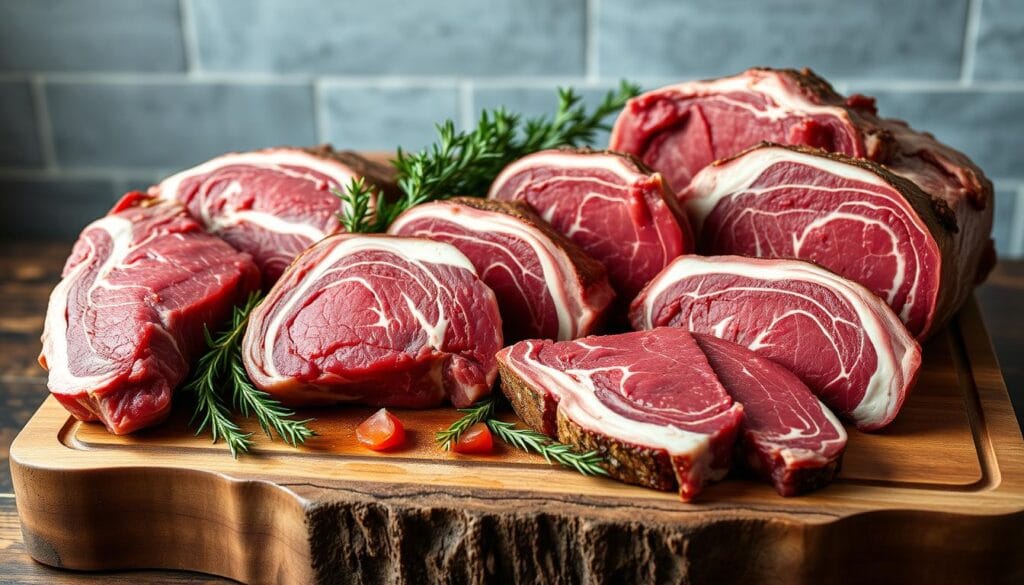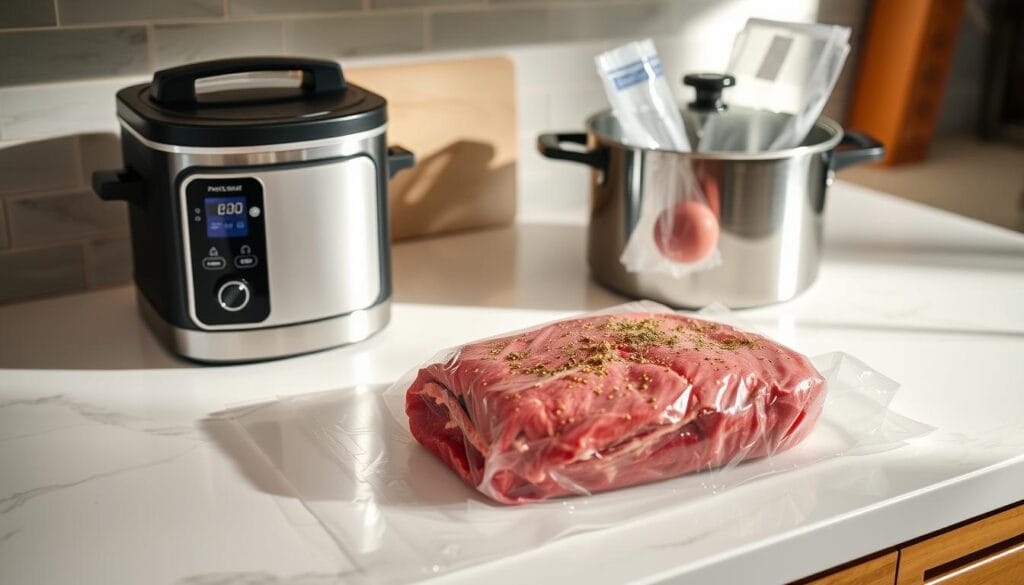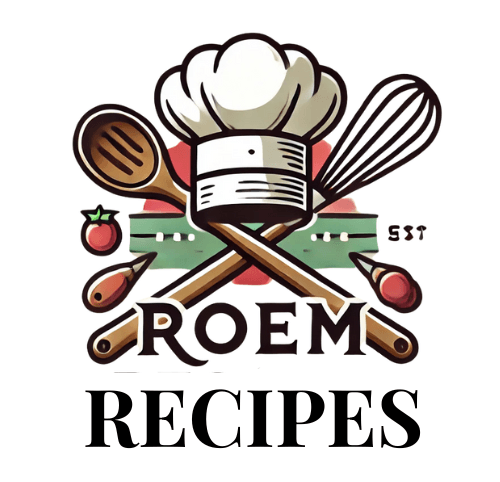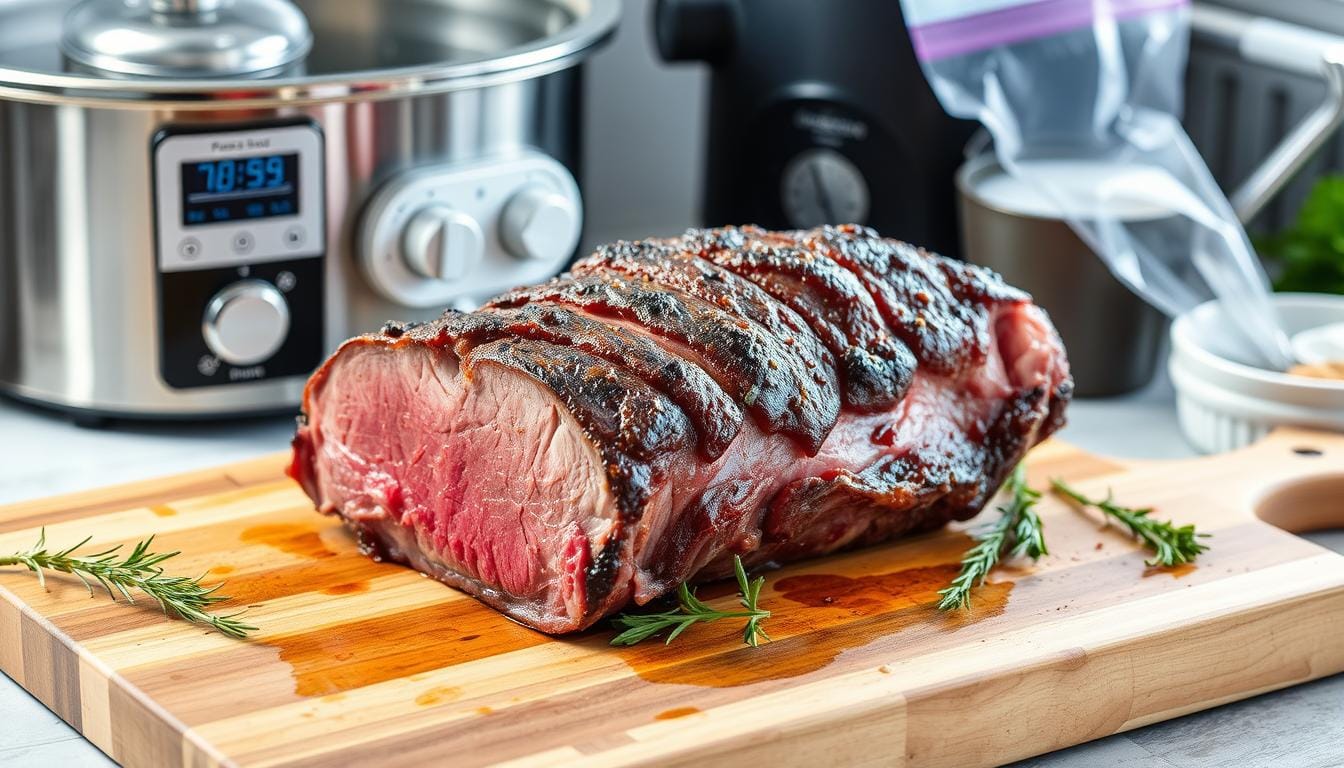Every holiday season, I’ve seen family gatherings change with the arrival of a legendary centerpiece – the prime rib roast. The quest for that perfect, melt-in-your-mouth texture seemed like culinary magic. But then I discovered the sous vide prime rib roast method.
Imagine serving a prime rib roast that’s consistently cooked to perfection, without the stress of traditional roasting techniques. Sous vide prime rib roast eliminates the guesswork, delivering restaurant-quality results right in your kitchen. This foolproof approach ensures every slice is tender, juicy, and cooked exactly to your preference.
Whether you’re a cooking novice or a seasoned chef, the sous vide method revolutionizes how we prepare this classic holiday dish. By using precise temperature control, you’ll create a prime rib roast sous vide that will impress even the most discerning dinner guests.
In this comprehensive guide, we’ll walk you through every step of creating the ultimate prime rib roast using sous vide technology. Get ready to transform your holiday cooking experience!
Understanding Prime Rib: The Ultimate Holiday Roast
Prime rib roast is the star of holiday meals, turning any event into a special feast. It comes from the rib section, ribs 6 through 12. This cut is famous for its tenderness and rich flavor.

What Makes Prime Rib Special
Prime rib roast is unique. It has:
- Exceptional marbling for juiciness
- Tender texture that’s a delight to eat
- Rich, bold flavor
The meat grade affects your prime rib experience. USDA Prime is the top quality. It has lots of marbling for the best flavor and tenderness.
Bone-in vs. Boneless Selection
Choosing between bone-in and boneless prime rib depends on your taste and cooking style:
| Bone-in Prime Rib | Boneless Prime Rib |
|---|---|
| Enhanced natural flavor | Easier carving |
| More visually impressive | Uniform cooking |
| Retains more moisture | Simpler preparation |
Sizing Guide for Your Gathering
Plan your prime rib roast with this guide: estimate 1 pound per person. A 5-pound bone-in roast serves 6-8 guests. A 3-pound boneless roast also covers about the same number.
Pro tip: Always buy slightly more than you think you’ll need – prime rib leftovers are a delicacy!
Essential Equipment for Sous Vide Prime Rib Roast
To make the perfect prime rib with sous vide, you need the right equipment. This ensures your dish turns out amazing. Choosing the right tools is key to success in gourmet cooking.

For sous vide cooking, you’ll need a few important items. These will help you make your prime rib taste like it’s from a fancy restaurant:
- Immersion circulator for precise temperature control
- Large water-resistant container or deep pot
- Vacuum sealer or high-quality freezer bags
- Roasting pan with a sturdy rack
- Kitchen twine for optional roast trussing
Your immersion circulator is the core of sous vide cooking. Brands like Anova make reliable precision cookers. These keep the water at a steady temperature, which is key for perfectly cooked meat.
“Invest in quality sous vide equipment, and you’ll transform home cooking into a gourmet experience.”
Vacuum sealers are crucial for preparing your prime rib. They remove all air, ensuring even cooking and keeping moisture in during sous vide.
| Equipment | Purpose | Recommended Features |
|---|---|---|
| Immersion Circulator | Temperature Control | Digital display, Wi-Fi connectivity |
| Vacuum Sealer | Meat Preparation | Strong sealing, multiple bag sizes |
| Water Container | Cooking Environment | Large capacity, heat-resistant |
Pro tip: Choose equipment that offers precision and durability to elevate your sous vide cooking experience.
Perfect Temperature and Timing Guide
Getting the sous vide temperature and prime rib cooking time right is key. It’s all about the perfect beef doneness. The taste and texture of your prime rib depend on it.
Temperature Settings for Different Doneness Levels
Choosing the right sous vide temperature makes your prime rib amazing. The perfect temperature depends on how rare you like it:
- Rare: 131°F (8-12 hours)
- Medium Rare: 135°F (8-12 hours)
- Medium: 140°F (8-12 hours)
- Medium Well: 145°F (8-12 hours)
- Well Done: 150°F (8-12 hours)
Cooking Duration Guidelines
The cooking time for your prime rib depends on its size and how tender you want it. Longer cooking times make the meat tender. But, avoid cooking for more than 8-12 hours to keep it from getting mushy.
“Precision is key when cooking prime rib sous vide. The right temperature guarantees consistent doneness throughout your roast.”
Why Time and Temperature Matter
Sous vide cooking gives you control over beef doneness. It ensures even cooking from edge to center. An instant-read thermometer helps you check the internal temperature, making your results top-notch.
Medium rare is the favorite among chefs and home cooks. It offers a perfect mix of tenderness and flavor.
Seasoning and Preparation Methods
Making the perfect prime rib starts with great seasoning and prep. Your sous vide seasoning will make the roast truly special. It’s all about adding layers of flavor that match the meat’s richness and make it tender.
Begin with a top-notch herb butter rub to turn your prime rib into a work of art. Mix up a strong seasoning blend with these ingredients:
- 1 1/2 tablespoons fresh thyme
- 1 1/2 tablespoons fresh rosemary
- 1 1/2 tablespoons onion powder
- 1 1/2 tablespoons garlic powder
- 1 1/2 tablespoons ground black pepper
Tip for seasoning prime rib: Make a fancy compound butter by mixing softened butter with your herb mix. Don’t add fresh garlic to the sous vide bag for food safety reasons.
“The secret to an exceptional prime rib is in the seasoning and preparation method.”
| Seasoning Component | Quantity | Purpose |
|---|---|---|
| Kosher Salt | 2 tablespoons | Primary flavor enhancement |
| Herb Butter | 4 oz | Moisture and flavor infusion |
| Black Pepper | 1 1/2 tablespoons | Spicy undertone |
Getting ready for sous vide is key. Season and vacuum seal your roast up to 24 hours before, keeping it in the fridge. This lets the flavors soak deep into the meat, giving it a rich taste.
Sous Vide Prime Rib Roast Step-by-Step Process
Learning to cook prime rib sous vide needs focus and skill. This guide will help you through each step. You’ll learn how to make a roast that will wow your guests.
Initial Setup and Bagging
Start by preparing your prime rib carefully. Pick a top-quality cut and trim off extra fat. But keep a thin layer for flavor. Vacuum sealing is key to a perfect cook.
- Choose a 2.5 lbs prime rib roast
- Season generously with salt and pepper
- Use vacuum sealing or water displacement method for bagging
- Add fresh herbs like thyme and rosemary
Water Bath Cooking Process
The water displacement method seals your meat well. Set your sous vide to 132°F for a medium-rare. Make sure the bag is fully submerged in the water bath.
| Prime Rib Size | Cooking Time | Temperature |
|---|---|---|
| 2.5 lbs | 6 hours | 132°F |
| 6-7 lbs | 8-10 hours | 132°F |
Post-Cooking Handling
Once cooked, take the roast out of the bag. Dry it with paper towels. Then, let it rest for 15 minutes before serving. This lets the juices spread evenly.
“Patience is key in the sous vide process – allow your meat to cook slowly and rest properly for the most tender results.”
Your prime rib is now ready for the final step. Searing will give it a crispy outside. And it will keep the inside juicy and tender, thanks to sous vide.
The Perfect Searing Technique
To get the ultimate prime rib crust, you need to master the reverse sear. After sous vide cooking, the final step turns your tender roast into a masterpiece. It gets a golden, crispy exterior.
The high-heat searing method is key for that restaurant-quality finish. You aim for a rich, caramelized crust. This should happen without losing the tender interior from sous vide cooking.
- Preheat your oven to the highest temperature possible (typically 500-550°F)
- Pat the roast completely dry to ensure optimal browning
- Place the roast on a rack in a roasting pan
- Sear for 8-10 minutes until a deep golden crust forms
“The secret to a perfect prime rib is patience and precision in the searing process.” – Professional Chef
Timing is crucial with the reverse sear technique. Keep a close eye on your roast during the last minutes. This prevents burning and creates a stunning crust.
Pro tip: Use a meat thermometer to monitor the internal temperature. This ensures you don’t overcook your perfectly prepared roast.
Creating the Perfect Au Jus
To turn your sous vide prime rib into a masterpiece, you need to master au jus. The right sauce can take your roast from good to great. It brings out the meat’s rich flavors.
The secret to amazing prime rib au jus is in the beef drippings. When you take the prime rib out of its bag, every drop is full of flavor.
Collecting Bag Juices for Maximum Flavor
Your sous vide bag has liquid gold – the beef juices that make a great au jus. Here’s how to get and use these drippings:
- Carefully strain the bag juices through a fine-mesh sieve
- Separate any solid particles from the pure liquid
- Keep all the flavorful beef broth from cooking
Enhancing Au Jus with Professional Techniques
To make a top-notch prime rib au jus, add these ingredients:
- Sauté finely chopped shallots in unsalted butter
- Deglaze the pan with a robust red wine
- Add collected beef drippings
- Incorporate beef broth for more depth
- Season with Worcestershire sauce
- Finish with fresh thyme leaves
| Ingredient | Quantity | Purpose |
|---|---|---|
| Beef Drippings | 1/2 cup | Base flavor |
| Beef Broth | 1 cup | Liquid volume |
| Red Wine | 1/2 cup | Depth and complexity |
| Worcestershire Sauce | 1 tablespoon | Umami enhancement |
Pro tip: Reduce your au jus until it’s thick and rich. This makes the flavors stronger and the sauce more luxurious.
A great au jus is not just a sauce—it’s the storyteller of your prime rib’s culinary journey.
Save leftover au jus in an airtight container in the fridge for up to 5 days. Or freeze it for up to 4 months. This way, you can enjoy it for a long time.
Serving and Presentation Tips
Your prime rib presentation is the highlight of your holiday feast. After making your sous vide masterpiece, the last steps can make it truly special.
Let the roast rest for 15-30 minutes before slicing. This step is key. It makes sure each slice is tender and full of flavor.
“A perfectly rested prime rib is the secret to a memorable holiday meal.”
Prime Rib Serving Suggestions
- Slice against the grain for maximum tenderness
- Use a sharp carving knife for clean, precise cuts
- Aim for slices approximately 1/2 inch thick
Recommended Prime Rib Sides
| Side Dish Category | Recommended Options |
|---|---|
| Vegetable Sides | Roasted asparagus, glazed carrots, Brussels sprouts |
| Starch Sides | Creamy mashed potatoes, wild mushroom risotto |
| Sauces | Horseradish cream, au jus, red wine reduction |
For a fancy prime rib look, add fresh herbs like rosemary or thyme. A bit of sea salt and black pepper can also make it look more elegant.
Pro tip: Leftover prime rib is great in sandwiches or as a French dip au jus for tomorrow’s meal.
Before diving into the conclusion, be sure to explore more delicious and easy-to-follow recipes on Roem Recipes. From perfectly cooked cuts of meat to innovative cooking techniques like sous vide, our collection has something for every home chef. Don’t miss our step-by-step guide to sous vide cooking or our popular holiday roast recipes for more inspiration to elevate your culinary creations!
Conclusion
Now, you can make your holiday roast amazing with sous vide cooking. This method turns a simple meal into a special dining experience. Every slice of meat is perfectly cooked, from edge to center.
The sous vide benefits go beyond just temperature control. It gives you consistent texture and flavor that will wow your guests.
Start your journey to holiday roast success by learning about sous vide cooking. It cooks meat evenly for 4-6 hours, making it tender. Each bite is full of flavor, with 33 grams of protein and balanced nutrition.
With this guide, you can make prime rib like a pro in your kitchen. You’ll learn about temperature control, searing, and preparation. This will boost your cooking skills.
Whether it’s for a special event or a fancy meal, sous vide prime rib is the best choice. It’s the top of home cooking innovation.
Try this cooking method and change how you cook premium meat. Your meals will become unforgettable, filled with flavor, texture, and precision.


9 thoughts on “Perfectly Tender Sous Vide Prime Rib Roast: A Foolproof Guide”